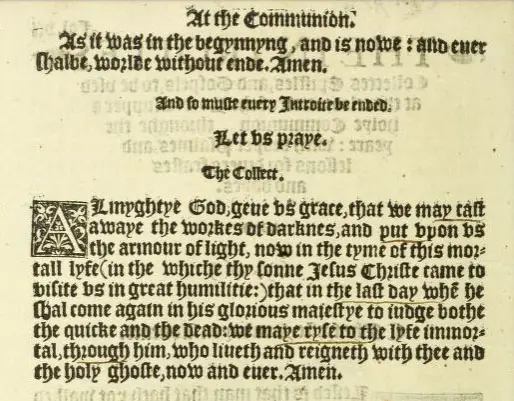December 3
Advent
Today is Advent Sunday, the first Sunday of Advent and the fourth Sunday before the Nativity. Today, we enjoy chocolate advent calendars and feasting at work Christmas meals and parties, December is a month of excess and fun. But in Tudor times, Advent was a time of fasting, a time to abstain from meat. This fast would continue until after midnight mass on Christmas Eve, when Christmas Day finally arrived.
Four weeks without meat would certainly make you appreciate the Christmas feast, wouldn't it?!
As the Tudor period saw the publication and use of The Book of Common Prayer, which was written and compiled by Thomas Cranmer, Archbishop of Canterbury, in 1549 and revised in 1552, I thought it was appropriate to share the Collect, Epistle and Gospel from the 1549 edition for the First Sunday of Advent.

The Collect
ALMYGHTYE God, geve us grace, that we may cast awaye the workes of darknes, and put upon us the armour of light, now in the tyme of this mortall lyfe, (in the whiche thy sonne Jesus Christe came to visite us in great humilitie:) that in the last day when he shal come again in his glorious majestye to judge bothe the quicke and the dead: we maye ryse to the lyfe immortal, through him, who liveth and reigneth with thee and the holy ghoste, now and ever. Amen.
The Epistle
Romans XIII (8-14)
OWE nothing to any man but this, that ye love one another. For he that loveth another, fulfilleth the law. For these commaundementes: Thou shalt not commit adultry: Thou shalt not kyll: Thou shalte not steale: Thou shalte beare no false witnes: Thou shalt not luste: and so forth (if there be any other commaundemente) it is al comprehended in this saiyng, namely, love thy neighbor as thyself. Love hurteth not his neyghbor; therfore is love the fulfillyng of the law. This also, we know the season, how that it is tyme that we should now awake out of slepe: for nowe is our salvacion nerer, then when we beleved. The nyght is passed, the day is come nye: let us therfore caste awaie the dedes of darkenes, and let us put on the armour of lyght. Let us walke honestlye, as it were in the day lyght: not in eating & drinking, neither in chambouryng and wantonnes, neither in stryfe nor enviyng: but put ye on the lord Jesus Christe. And make not provision for the fleshe, to fulfill the lustes of it.
The Gospel
Matthew XXI (1-13)
AND when they drew nigh to Jerusalem, and were com to Bethphage unto Mount Olivet, then sente Jesus two disciples, saying unto them: Goe into the towne that lyeth over agaynst you, and anone ye shall fynde an Asse bound, and a Colte with her: looce them and bryng them unto me. And if any man say ought unto you, say ye, the lord hath neede of them: and straightway he wil let them goe. All this was done that it myghte bee fulfilled, whiche was spoken by the Prophete, saying: Tell ye the daughter of Sion, behold, thy kyng cummeth unto thee, meke, sitting upon an Asse & a colt, the fole of the Asse used to the yoke. The disciples went & did as Jesus commaunded them, & brought the Asse, and the Colte, and put on them theyr clothes, and set him theron. And many of the people spred theyr garmentes in the waye. Other cut downe braunches from the trees, and strawed them in the way. Moreover the people that wente beefore, and they that came after, cryed saying: Hosanna to the sonne of David: Blessed is he that cummeth in the name of the lorde, Hosanna in the higheste. And when he was come to Jerusalem all the citie was moved, saying: who is this? And the people sayde, this is Jesus the Prophete of Nazareth a citie of Galile. And Jesus went into the temple of god, and cast out al them that solde and boughte in the temple, and overthrew the tables of money chaungers, and the seates of them that solde doves, and said unto them: It is written: My house shall be called the house of prayer, but ye have made it denne of theves.
Source: The booke of the common prayer and administracion of the sacramentes : and other rites and ceremonies of the Churche : after the vse of the Churche of England, 1549, printed in London by Edward Whitchurch.
This can be read at https://archive.org/stream/bookeofcommonpra00chur_1#page/n9/mode/2up